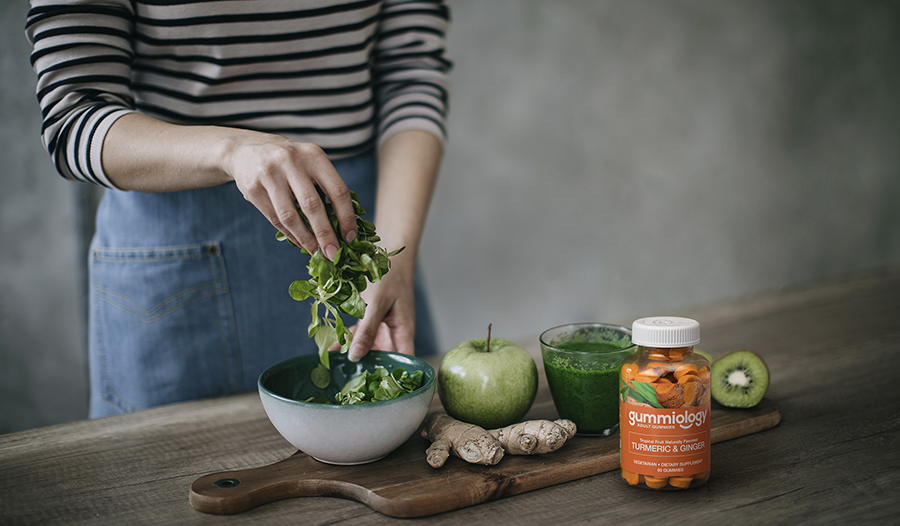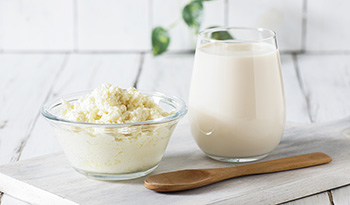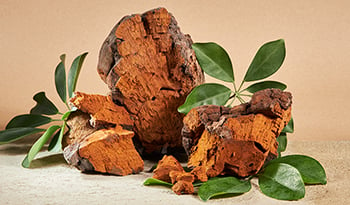3 naturliga sätt att bekämpa inflammation i kroppen varje dag

Om du visste att du kunde göra några förändringar i ditt liv och möjligen förhindra en myriad av hälsotillstånd, inklusive diabetes, hjärtsjukdomar, stroke, Alzheimers sjukdom eller artrit, skulle du göra dessa förändringar? Vad vi har lärt oss om inflammation och hälsa de senaste åren är inget annat än häpnadsväckande.
Inflammation är kärnan i många av dessa sjukdomar. Faktum är att inflammation är den grundläggande bakomliggande orsaken till de flesta sjukdomar, sjukdomar, snabbare åldrande och viktökning. Och inte överraskande är några av de mest effektiva förebyggande åtgärderna vi kan vidta näringsrelaterade.
Vi har alla inflammation. Det ironiska är att vi behöver det. Ja, inflammation främjar en frisk kropp - i små mängder. Faktum är att utan inflammation skulle vi inte leva.
Typer av inflammation
Det finns två typer av inflammation: akut inflammation och tyst inflammation. Var och en av oss är akut medveten om inflammation. Hur vet vi detta? Eftersom vi upplever det ofta. Varje gång du blir skadad eller sjuk, lider av en fruktansvärd förkylning eller hudar knäet, kommer inflammatoriska föreningar som små proteiner som kallas cytokiner och vita blodkroppar som kallas neutrofiler och makrofager rusa till undsättning. Även om det känns obekvämt är det mycket bra eftersom vi utan akut inflammation inte skulle läka.
Låt oss ta ett snitt på fingret till exempel. När du skär fingret rusar små soldater till sårplatsen, såret läker, soldaterna går bort, inflammationen försvinner och allt är bra. Vi behöver detta korta inflammatoriska svar och sedan behöver vi det för att försvinna.
Nu när akut inflammation inte läker utan istället fortsätter att frigöra inflammatoriska föreningar, blir det kronisk eller tyst inflammation och denna typ är den mest dödliga eftersom den inte försvinner. Tyst inflammation är som att ha ett sår på insidan av kroppen som aldrig läker.
Många av oss lever med kronisk smärta dagligen från tandvärk till bankande leder. Att leva med nagande eller obeveklig smärta kan vara en källa till stress och potentiell depression som bara förvärrar dessa smärtsamma tillstånd.
Det finns naturliga sätt att hjälpa din kropp att minska smärtan och i vissa fall läka källan till den. Tyvärr sträcker sig många efter mediciner som har kraftfulla biverkningar som kan lämna en med ännu fler hälsotillstånd. Det är därför specifika, väl undersökta näringsämnen kan ha lika stor inverkan och kan till och med ha mer i vissa fall än mediciner.
Vad orsakar inflammation?
Precis som vissa livsmedel kan dämpa inflammation, kan andra bränna bränderna. Det är mycket viktigt att inte bara veta vad som kommer att minska inflammation, men vad som kommer att främja det. Dessa livsmedel, tillstånd och livsstilsfaktorer kan förvärra inflammation:
- Socker
- Den amerikanska standarddieten
- Raffinerade, bearbetade oljor som grönsaker, soja, majs och raps
- Övervikt och fetma
- Ohälsosamma tarmbakterier
- Näringsbrist
- Stillasittande livsstil
- Brist på sömn
- Kronisk stress
- Åldrande
Naturliga sätt att bekämpa inflammation
Inflammation kan orsaka betydande skador på vår hälsa och att veta vilka livsmedel och riktade tillskott som kan hjälpa är en grundläggande plats att börja stoppa det i sina spår.
1. Välj antiinflammatoriska livsmedel
Antiinflammatoriska livsmedel som bär, bladgrön, fet fisk, olivolja, extra virgin kokosolja, alla teer, särskilt svart, ingefära, gurkmejaoch grönt te är nyckeln, kryddor och örter som gurkmeja, kummin, kanel, basilika, persiljaoch ingefära; mörk choklad; korsblommiga grönsaker som blomkål och broccoli; nötter som valnötter eller pekannötter och frön som pumpa eller solrosfrön är allmäktiga livsmedel för att bekämpa inflammation.
2. Mata ditt mikrobiom
Tänk på din tarm som en trädgård. Det första steget i att skapa en hälsosam tarm är att du drar ogräset: du slutar mata de dåliga tarmbuggarna genom att vägra att äta inflammatorisk mat - detta är deras huvudsakliga matkälla.
Det andra steget är att plantera friska tarmbakterier. Din tarm kommer att bli friskare genom att se till att du planterar den med hälsosamma probiotika via ett kvalitetstillskott, fermenterade livsmedel, odlade livsmedel eller en kombination. Att äta antiinflammatoriska livsmedel stöder bättre ett mikrobiom av olika, fördelaktiga bakterier som i sin tur hjälper till att minska och förhindra kronisk inflammation.
Det tredje steget är att gödsla din tarmträdgård. Du vill se till att du matar dessa friska tarmprobiotika med tarmgödsel eller prebiotika. Dessa inkluderar kronärtskockor, lök, vitlök, purjolök, linfrön (malda), bär, äpplen, bönor och potatisstärkelse. Kom ihåg att du inte vill att de dåliga, ohälsosamma tarmbuggarna ska trivas och överleva via inflammatoriska livsmedel, du vill skapa ett överflöd av friska tarmbuggar via friska prebiotika - friska tarmbakteriers huvudsakliga matkälla.
3. Ta kosttillskott som minskar inflammation
- Curcumin: Curcumin är den aktiva föreningen i kryddan gurkmeja. Ett överflöd av forskning visar curcumins fördelar för att minska inflammation, inklusive lika effektivt som NSAID.
- Kanel: Kanel innehåller antiinflammatoriska, antioxidanta och antimikrobiella effekter.
- Magnesium glycinat: Majoriteten av människor har brist på magnesium. Magnesium har visat sig hjälpa till att bekämpa inflammation. Det minskar inflammatorisk markör CRP och ger flera andra fördelar
- Svart kumminfröolja: En ört som visat sig minska inflammation vid både reumatoid artrit och artros.
- Fiskolja: En mycket potent antiinflammatorisk, hög i omega-3-fettsyror (DHA och EPA) för att hjälpa till att stoppa och lösa cellulär inflammation. Det är också utmärkt för hjärthälsa.
- Krillolja: En mycket biotillgänglig form av omega-3-fettsyror som kan passera blod-hjärnbarriären, till skillnad från andra omega-3-fetter.
- Torskleverolja: En kraftfull fiskolja som skyddar hälsan. Det är högt i vitamin D och vitamin A. Det kan också minska blodproppsbildning och minska inflammation i kroppen.
- Ingefära: Ingefära har visat sig stödja matsmältningshälsan och hjälper till och med att tillfälligt lindra mild illamående och magbesvär. Dessutom har ingefära ett brett utbud av kraftfulla fria radikalsläckande föreningar som hjälper till att minska inflammation.
- Boswellia: Boswellia fytosom, även känd som rökelse, stöder ett hälsosamt inflammatoriskt svar i luftvägarna och mag-tarmkanalen, såväl som i leder, muskler och senor. Boswellia hjälper också till att balansera det inflammatoriska svaret för att skydda hjärnvävnaden.
- Linfröolja: Hög i ALA (växtbaserade omega-3-fetter), denna koncentrerade källa till omega-3 kan hjälpa till att hålla inflammation i schack, och som en hälsosam fettkälla hjälper den till att stödja optimal cellulär hälsa.
- Grönt teextrakt: Detta stöder cellulär, kardiovaskulär och kognitiv hälsa. Den är rik på växtföreningar som kallas polyfenoler, varav den mest kända är EGCG, som har rikliga hälsofrämjande egenskaper.
- Bromelain: Bromelain är ett proteolytiskt enzym som härrör från ananasväxtens stam. När det tas mellan måltiderna kan det hjälpa till att stödja ledkomforten och kan hjälpa till att lindra tillfällig ömhet som är förknippad med muskelöveranvändning.
- Kollagenpulver: Kollagen bidrar till tillväxt och underhåll av friska vävnader. Det är det strukturella proteinet som är viktigt för styrkan i benen och flexibiliteten i leder, senor, ligament, hår, hud och naglar. I pulverform kan den läggas till smoothies, kaffe eller shakes.
Avhämtning
Med några enkla kost- och livsstilsförändringar kan du bekämpa inflammation — istället för att främja den — varje dag. Se till att diskutera eventuella betydande förändringar i din kost, inklusive införlivande av nya kosttillskott, med din primärvårdsläkare.
ANSVARSFRISKRIVNING:Denna Wellness Hub avser inte att tillhandahålla diagnos ...
















































































 Innehållsförteckning
Innehållsförteckning














